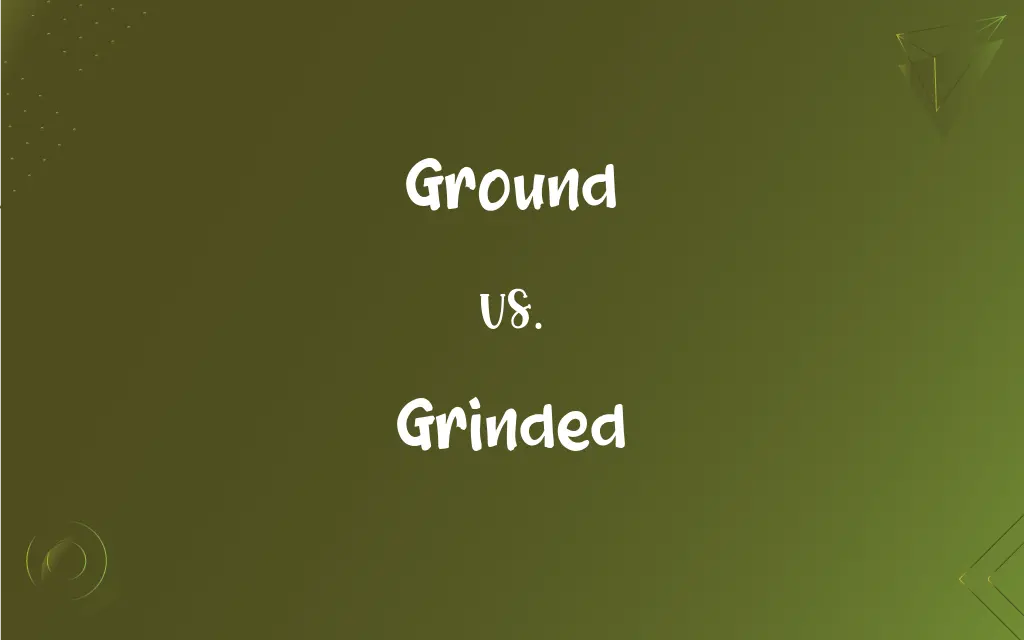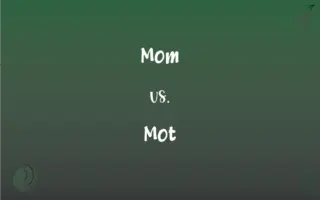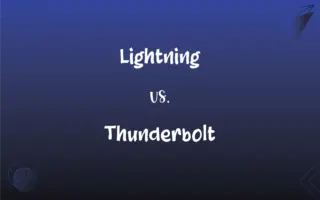Ground vs. Grinded: What's the Difference?
Edited by Harlon Moss || By Janet White || Updated on October 7, 2023
Ground is the past tense of grind, relating to reducing something to small particles. Grinded is a less commonly used form for the past tense of grind.

Key Differences
Ground and Grinded both pertain to the action of breaking something down into smaller parts, often through the use of friction or abrasion, typically using a grinding machine. Ground is considered the correct past tense and past participle of the verb grind. For instance, one might say, “She ground the coffee beans.” This phrase implies that she reduced the coffee beans to smaller particles or powder. It’s a term often associated with the preparation of coffee, spices, and certain foods.
Grinded, on the other hand, is an incorrect form and is generally considered nonstandard, though it may appear colloquially or dialectally. It's the irregular form of the past tense of grind, suggesting that something has been processed or reduced to smaller parts. Usage of grinded can create ambiguity and might be perceived as less formal or incorrect in formal writing or conversation, and thus, it's better to stick to “ground” when referring to the past action of grinding.
Ground, due to being the standard past tense form, is widely accepted and recognized, making it the preferable choice in professional, academic, and everyday settings. It’s versatile, implying various actions, such as the process of reducing, refining, or processing different materials, often associated with precision and methodology, and is applied across various contexts and industries.
Grinded may be understood, but its use can lead to misinterpretations and misunderstandings, particularly in formal or professional settings where correct grammar and usage are critical. Its appearance is largely colloquial, and it’s typically avoided in formal discourse, scholarly articles, and literature.
While Ground represents a clear, concise, and grammatically correct representation of past action, adopting Grinded might diminish the clarity and credibility of the expression, making it essential to choose the appropriate form, especially in formal communications, to maintain clarity and correctness.
ADVERTISEMENT
Comparison Chart
Acceptance
Widely accepted as correct.
Generally considered nonstandard and incorrect.
Usage
Used in formal and informal contexts.
Rarely used, mostly in colloquial or dialectal forms.
Clarity
Offers clear and concise communication.
May lead to ambiguity and misunderstandings.
Versatility
Applies to various actions and industries.
Limited and often avoided in formal discourse.
Recognition
Universally recognized as the correct form.
May not be recognized or accepted as correct.
ADVERTISEMENT
Ground and Grinded Definitions
Ground
Past tense of grind, to reduce something to small particles.
She ground the coffee beans.
Grinded
Nonstandard past tense of grind.
He grinded the gears.
Ground
To establish a basis.
The theory is grounded in empirical evidence.
Grinded
To perform the action of grinding in an incorrect tense.
He grinded the coffee instead of saying he ground the coffee.
Ground
The solid surface of the earth.
Grinded
To execute the process of abrasion in an irregular form.
He grinded the edges of the metal piece.
Ground
The floor of a body of water, especially the sea.
Grinded
To participate in grind dancing.
They grinded on the dance floor.
Ground
Soil; earth
Level the ground for a lawn.
Grinded
To reduce something to smaller parts in nonstandard grammar.
She grinded the spices for the dish.
Ground
Often grounds An area of land designated for a particular purpose
A burial ground.
Parade grounds.
Grinded
(nonstandard) grind
Ground
Often grounds The land surrounding or forming part of a house or another building
A guesthouse on the grounds of the mansion.
Grinded
(video gaming) grind
I grinded for experience before I took on the boss.
Ground
An area or a position that is contested in or as if in battle
The soldiers held their ground against the enemy. Character witnesses helped the defendant stand her ground in the trial.
Grinded
Ground.
Ground
Something that serves as a foundation or means of attachment for something else
A ground of white paint under the mural.
Ground
A surrounding area; a background.
Ground
Often grounds The foundation for an argument, belief, or action; a basis.
Ground
Often grounds The underlying condition prompting an action; a cause
Grounds for suspicion.
A ground for divorce.
Ground
The surface of the Earth, as opposed to the sky or water or underground.
Look, I found a ten dollar bill on the ground!
Ground
(uncountable) Terrain.
Ground
Soil, earth.
The worm crawls through the ground.
The fox escaped from the hounds by going to ground.
Ground
(countable) The bottom of a body of water.
Ground
Basis, foundation, groundwork, legwork.
Ground
, (epistemic) justification, cause.
You will need to show good grounds for your action.
He could not come on grounds of health, or on health grounds.
Ground
Background, context, framework, surroundings.
Ground
(historical) The area on which a battle is fought, particularly as referring to the area occupied by one side or the other. Often, according to the eventualities, "to give ground" or "to gain ground".
Ground
Advantage given or gained in any contest; e.g. in football, chess, debate or academic discourse.
Ground
The plain surface upon which the figures of an artistic composition are set.
Crimson flowers on a white ground
Ground
(sculpture) A flat surface upon which figures are raised in relief.
Ground
(point lace) The net of small meshes upon which the embroidered pattern is applied.
Brussels ground
Ground
(etching) A gummy substance spread over the surface of a metal to be etched, to prevent the acid from eating except where an opening is made by the needle.
Ground
One of the pieces of wood, flush with the plastering, to which mouldings etc. are attached.
Grounds are usually put up first and the plastering floated flush with them.
Ground
(countable) A soccer stadium.
Manchester United's ground is known as Old Trafford.
Ground
An electrical conductor connected to the earth, or a large conductor whose electrical potential is taken as zero (such as a steel chassis).
Ground
The area of grass on which a match is played (a cricket field); the entire arena in which it is played; the part of the field behind a batsman's popping crease where he can not be run out (hence to make one's ground).
Ground
(music) A composition in which the bass, consisting of a few bars of independent notes, is continually repeated to a varying melody.
Ground
(music) The tune on which descants are raised; the plain song.
Ground
The pit of a theatre.
Ground
(US) To connect (an electrical conductor or device) to a ground.
Ground
(transitive) To punish, especially a child or teenager, by forcing them to stay at home and/or give up certain privileges.
If you don't clean your room, I'll have no choice but to ground you.
Eric, you are grounded until further notice for lying to us about where you were last night!
My kids are currently grounded from television.
Ground
(transitive) To forbid (an aircraft or pilot) to fly.
Because of the bad weather, all flights were grounded.
Ground
To give a basic education in a particular subject; to instruct in elements or first principles.
Jim was grounded in maths.
Ground
(baseball) To hit a ground ball. Compare fly (verb (regular)) and line (verb).
Ground
To place something on the ground.
Ground
(intransitive) To run aground; to strike the bottom and remain fixed.
The ship grounded on the bar.
Ground
To found; to fix or set, as on a foundation, reason, or principle; to furnish a ground for; to fix firmly.
Ground
(fine arts) To cover with a ground, as a copper plate for etching, or as paper or other materials with a uniform tint as a preparation for ornament.
Ground
To improve or focus the mental or emotional state of.
I ground myself with meditation.
Ground
Simple past tense and past participle of grind
I ground the coffee up nicely.
Ground
Crushed, or reduced to small particles.
Ground mustard seed
Ground
Processed by grinding.
Lenses of ground glass
Ground
The surface of the earth; the outer crust of the globe, or some indefinite portion of it.
There was not a man to till the ground.
The fire ran along upon the ground.
Ground
Any definite portion of the earth's surface; region; territory; country.
From . . . old Euphrates, to the brook that parts Egypt from Syrian ground.
Ground
Land; estate; possession; field; esp. (pl.), the gardens, lawns, fields, etc., belonging to a homestead; as, the grounds of the estate are well kept.
Thy next design is on thy neighbor's grounds.
Ground
The basis on which anything rests; foundation. Hence: The foundation of knowledge, belief, or conviction; a premise, reason, or datum; ultimate or first principle; cause of existence or occurrence; originating force or agency; as, the ground of my hope.
Ground
That surface upon which the figures of a composition are set, and which relieves them by its plainness, being either of one tint or of tints but slightly contrasted with one another; as, crimson Bowers on a white ground.
Ground
A gummy composition spread over the surface of a metal to be etched, to prevent the acid from eating except where an opening is made by the needle.
Ground
One of the pieces of wood, flush with the plastering, to which moldings, etc., are attached; - usually in the plural.
Ground
A composition in which the bass, consisting of a few bars of independent notes, is continually repeated to a varying melody.
On that ground I'll build a holy descant.
Ground
A conducting connection with the earth, whereby the earth is made part of an electrical circuit.
Ground
Sediment at the bottom of liquors or liquids; dregs; lees; feces; as, coffee grounds.
Ground
The pit of a theater.
There is no way for duty to prevail, and get ground of them, but by bidding higher.
These nine . . . began to give me ground.
Ground
To lay, set, or run, on the ground.
Ground
To found; to fix or set, as on a foundation, reason, or principle; to furnish a ground for; to fix firmly.
Being rooted and grounded in love.
So far from warranting any inference to the existence of a God, would, on the contrary, ground even an argument to his negation.
Ground
To instruct in elements or first principles.
Ground
To connect with the ground so as to make the earth a part of an electrical circuit.
Ground
To forbid (a pilot) to fly an airplane; - usually as a disciplinary measure, or for reasons of ill health sufficient to interfere with performance.
Ground
To forbid (aircraft) to fly; - usually due to the unsafe condition of the aircraft or lack of conformity to safety regulations; as, the discovery of a crack in the wing of a Trijet caused the whole fleeet to be grounded for inspection.
Ground
To temporarily restrict the activities of (a child), especially social activity outside the house; - usually for bad or unsatisfactory conduct; as, Johnny was grounded for fighting at school and can't go to the movies for two weeks.
Ground
To run aground; to strike the bottom and remain fixed; as, the ship grounded on the bar.
Ground
The solid part of the earth's surface;
The plane turned away from the sea and moved back over land
The earth shook for several minutes
He dropped the logs on the ground
Ground
A rational motive for a belief or action;
The reason that war was declared
The grounds for their declaration
Ground
The loose soft material that makes up a large part of the land surface;
They dug into the earth outside the church
Ground
A relation that provides the foundation for something;
They were on a friendly footing
He worked on an interim basis
Ground
A position to be won or defended in battle (or as if in battle);
They gained ground step by step
They fought to regain the lost ground
Ground
The part of a scene (or picture) that lies behind objects in the foreground;
He posed her against a background of rolling hills
Ground
Material in the top layer of the surface of the earth in which plants can grow (especially with reference to its quality or use);
The land had never been plowed
Good agricultural soil
Ground
A relatively homogeneous percept extending back of the figure on which attention is focused
Ground
A connection between an electrical device and the earth (which is a zero voltage)
Ground
(art) the surface (as a wall or canvas) prepared to take the paint for a painting
Ground
The first or preliminary coat of paint or size applied to a surface
Ground
Fix firmly and stably;
Anchor the lamppost in concrete
Ground
Confine or restrict to the ground;
After the accident, they grounded the plane and the pilot
Ground
Place or put on the ground
Ground
Instruct someone in the fundamentals of a subject
Ground
Bring to the ground;
The storm grounded the ship
Ground
Hit or reach the ground
Ground
Throw to the ground in order to stop play and avoid being tackled behind the line of scrimmage
Ground
Hit a groundball;
He grounded to the second baseman
Ground
Hit onto the ground
Ground
Cover with a primer; apply a primer to
Ground
Connect to a ground;
Ground the electrical connections for safety reasons
Ground
Use as a basis for; found on;
Base a claim on some observation
Ground
Broken or pounded into small fragments; used of e.g. ore or stone;
Paved with crushed bluestone
Ground glass is used as an abrasive
Ground
To prohibit from flying.
The pilot was grounded due to poor visibility.
Ground
To connect electrically with the earth.
The appliance must be properly grounded.
FAQs
Is Grinded a standard English term?
No, Grinded is considered nonstandard and incorrect in formal English.
Why is Grinded considered nonstandard?
Grinded is considered nonstandard as the accepted past tense and past participle of grind is Ground.
Is Ground the correct past tense of grind?
Yes, Ground is the correct and standard past tense of grind.
Can Ground refer to the earth’s surface?
Yes, Ground can refer to the solid surface of the earth.
Is Ground universally recognized as correct?
Yes, Ground is universally recognized and accepted as the correct past tense of grind.
Is Grinded acceptable in academic writing?
No, Grinded is typically not acceptable in academic writing and is considered incorrect.
Can Ground be used to describe the basis of a theory?
Yes, Ground can be used to describe the basis or foundation of a theory or argument.
Is Grinded understood in colloquial conversation?
Yes, Grinded might be understood in colloquial conversation, but it is avoided in formal settings.
Can Grinded appear in informal writing or speech?
Yes, while it’s nonstandard, Grinded might appear in informal writing or speech.
Is Ground applicable in various industries?
Yes, Ground is versatile and is used in various contexts and industries, including food processing and aviation.
Can Ground be used in the context of electrical circuits?
Yes, Ground can refer to connecting an electrical circuit to the earth to avoid electrical shock.
Can Ground refer to prohibiting flight?
Yes, Ground can mean to prohibit or restrict aircraft from flying.
Does the usage of Grinded affect clarity in communication?
Yes, using Grinded may lead to misunderstandings and is generally less clear than using Ground.
Can Grinded be used to describe dance moves?
Yes, Grinded can colloquially describe certain dance moves, though it’s nonstandard.
Does Ground offer precise and concise communication?
Yes, using Ground provides clear, concise, and correct communication in English.
About Author
Written by
Janet WhiteJanet White has been an esteemed writer and blogger for Difference Wiki. Holding a Master's degree in Science and Medical Journalism from the prestigious Boston University, she has consistently demonstrated her expertise and passion for her field. When she's not immersed in her work, Janet relishes her time exercising, delving into a good book, and cherishing moments with friends and family.
Edited by
Harlon MossHarlon is a seasoned quality moderator and accomplished content writer for Difference Wiki. An alumnus of the prestigious University of California, he earned his degree in Computer Science. Leveraging his academic background, Harlon brings a meticulous and informed perspective to his work, ensuring content accuracy and excellence.































































